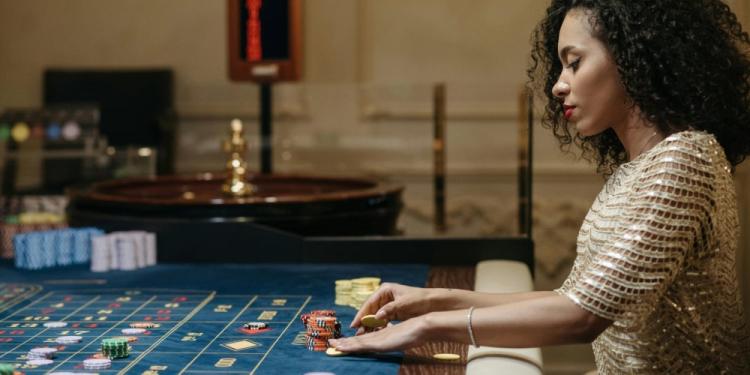Bizarre Gambling Systems Won’t Increase Your Winning Chances
Posted: May 22, 2024
Updated: May 22, 2024
In the race to win cash before your bankroll is completely used up, many online casino players resort to bizzarre gambling systems. It's true that many of these look good on paper. But in the real world of table betting limits and card shuffling machines, non of them work. We suggest they are great methods to try for fun. But don't go betting the farm with any of them.

The allure of gambling has persisted for centuries. Over this time it has spawned a wealth of tactics and superstitions alongside it. But while some strategies aim to crack the code, others are nothing more than bizarre gambling systems that veer into the downright weird. With the explosion of online casinos offering everything from slots to live roulette, these quirky approaches have found a new home. Prepare as Gamingzion.com dives into the most bizarre gambling systems ever devised!
The Martingale System
For centuries, gamblers have chased the dream of a foolproof system. Of these, the Martingale System is a prime example of one of the best-known bizarre gambling systems. This strategy, with origins dating back to 18th-century France, promises a path to guaranteed profits built on a deceptively simple idea. Simply double your bet after every loss. The logic goes like this – eventually, you’ll win a bet, and that win will not only recoup all your previous losses but also generate a profit equal to your original stake. Imagine you’re playing roulette, betting on red. You start with $10 on red and lose. The Martingale approach dictates you double your bet to $20 on the next spin. If red still loses, you’d double again to $40. This continues until you finally land on red. Let’s say it hits on your third try ($40 bet). You win $40, recovering your $60 in losses ($10 + $20 + $40) and pocketing a cool $10 profit.
However, Martingale’s Achilles’ heel lies in its assumption of an infinite bankroll. What happens if you experience a long losing streak? Let’s say you hit seven blacks in a row on roulette. To win back your losses on the eighth spin, you’d need a staggering $1280 bet! Most casinos have betting limits in place, specifically to prevent this very strategy. Even without limits, running out of money before a win is a real possibility. This will leave you with nothing but significant losses. Whether you’re gambling at a brick and mortar casino, or online at a casino like King Billy Casino, we suggest you stay well clear of this so-called betting system.
Understanding The Gambler’s Fallacy
Have you ever been at a casino and overheard someone say, “Black hasn’t hit in ten spins, it’s definitely due for red!”? That is a classic case of the Gambler’s Fallacy. This common misconception leads players to believe that past events influence future outcomes in games of chance. Here’s how it works: Imagine you’re watching a thrilling game of roulette. The ball has landed on red five times consecutively. Now, picture a gambler convinced that because of this streak, black is a “shoo-in” for the next spin. They place a hefty bet on black, confident they’ve outsmarted the wheel.

However, the beauty (and frustration) of roulette lies in its randomness. Each spin is an independent event. The tiny ball has no memory of where it landed previously. The odds of black or red coming up on any given spin remain exactly the same, a constant 47.4% (excluding the green pockets). Falling for the Gambler’s Fallacy can be a recipe for disaster. These bizarre gambling systems lead to impulsive decisions based on a faulty assumption. It’s a surefire way of draining your roulette bankroll faster. Remember, every spin is a fresh start. It’s a blank canvas where anything – red, black, or even green – is equally likely.
Bizarre Gambling Systems -The Reverse Martingale System
The Reverse Martingale strategy takes the classic Martingale approach and flips it on its head. Instead of doubling down on losses, it hinges on the idea of maximising winning streaks. Here’s the gist: you start with a base bet, say $10. If you win, you double your bet to $20 on the next round. Another win means doubling again to $40, and so on. The idea is to snowball your profits by riding a hot hand. While this might seem logical, the Reverse Martingale isn’t without its flaws.
Remember, casinos love random chance, and even the hottest streaks eventually cool down. Let’s revisit our $10 bet example. Imagine you win three rounds in a row, bringing your bet to a hefty $80. But in the fourth round, you hit a losing streak. Not only do you lose that $80, but you also have to start over with your base $10 bet. In essence, one losing streak with these bizarre gambling systems can wipe out all your profits and leave you in the red.
The D’Alembert System
The D’Alembert System is one of the most bizarre gambling systems with a long history, and takes a more measured approach compared to its high-risk cousin, the Martingale. Here’s the core idea: you decide on a base betting unit (let’s say $5). After every loss, you bump up your bet by one unit ($5 becomes $6). Conversely, each win prompts you to decrease your bet by one unit. The underlying assumption? Over time, these adjustments will lead you closer to breaking even, minimising losses. While the D’Alembert appears less reckless than the Martingale’s all-or-nothing approach, it’s important to temper your expectations. There’s a catch: the system hinges on the idea that wins and losses will eventually balance out, which isn’t guaranteed. Casino games are designed for the house to have an edge, meaning you’re more likely to lose in the long run.
Imagine this scenario: you start with a $5 bet and experience a three-game losing streak. Now you’re betting $8. Finally, you win a round, bringing your bet back down to $7. But even with this win, you’re still $1 down from where you began. The small gains from wins might feel underwhelming compared to the potential for a single large loss.
Bizarre Gambling Systems – Oscar’s Grind System
For decades, gamblers have whispered about some bizarre gambling systems that promise slow but steady gains – Oscar’s Grind. According to online casino news in the US, it’s named after a possibly mythical gambler who supposedly conquered roulette in the 1950s, this strategy isn’t about striking it rich fast. It’s about chipping away at the odds, one calculated bet at a time. Oscar’s Grind is a versatile strategy that can be applied beyond roulette, finding use in craps and blackjack as well. Here’s the core principle: you start with a chosen bet amount, say $10. Win a bet? Great! Increase your next bet by one unit ($10 becomes $11).
But if you lose? No worries, keep the bet amount the same. The goal? To slowly accumulate small wins, one betting unit at a time. The beauty of Oscar’s Grind lies in its simplicity and risk management. Losing streaks won’t cripple your bankroll, as you only wager the same amount. However, there’s a flip side to this cautious approach. Building a profit can be a slow process, requiring patience and discipline. Remember, even Oscar’s Grind doesn’t guarantee victory. Lady Luck can still turn a frown on you, and you might still experience losses. Additionally, casinos with high minimum bets can put a damper on this strategy.
The Law Of The Thirds
Have you ever heard of the Law of Thirds in roulette? It proposes tempting yet bizarre gambling systems: divide the wheel into thirds (numbers 1-12, 13-24, 25-36), bet on one section for a set number of spins, then move on to the next. The logic? Each third “should” hit one-third of the time, maximising your wins. Sounds good, right? Unfortunately, the Law of Thirds crumbles under scrutiny. Here’s the reality: roulette is a game of pure chance.
Every spin is independent, and the ball has no memory of where it landed previously. Each number, including the dreaded green zero, has an equal probability of appearing on any given spin – roughly 47.4%. Imagine you place your bet on the first third (1-12) for ten spins. While it’s certainly possible for several numbers in that section to hit during those spins, there’s no guarantee. The ball could just as easily land on red or black outside your chosen area ten times in a row. It’s the same story at even the top online casino sites in the US, like King Billy Casino.
Bizarre Gambling Systems – The Iron Cross
Craps veterans might have mentioned the Iron Cross, a strategy that aims to minimise losses by covering a large swathe of the table. Intriguing, right? Here’s how it works: you place multiple bets to encompass (almost) all the possible winning outcomes, essentially leaving only the number seven out in the cold. Imagine you’re ready to roll. The Iron Cross involves four bets:
- A Field Bet: This covers numbers 2, 3, 4, 9, 10, 11, and 12.
- Place Bets on 5 and 6: These bets win if either number is rolled before a seven.
Sounds like a surefire way to win, right? Not quite. The Achilles’ heel of these bizarre gambling systems is that the Iron Cross is the very number it excludes – seven. In craps, seven is the most common outcome, with a whopping six ways to roll it (1-6 + 6-1, 2-5 + 5-2, 3-4 + 4-3). Let’s say you place your Iron Cross bets. If any number besides seven appears, you win something. But if that pesky seven shows up, you lose all your wagers. This can happen frequently, chipping away at your bankroll.
Conclusion – Bizarre Gambling Systems
Casino games are designed to give the house an edge, meaning the odds are always stacked slightly in their favour. Bizarre gambling systems like the Martingale System or the Law of Thirds might seem like clever workarounds, but they rely on misconceptions or require unrealistic bankrolls. In the end, these strategies and bizarre gambling systems can’t alter the inherent house advantage. Responsible gambling is about understanding the odds and enjoying the games for what they are. In other words, a fun test of luck, not a path to guaranteed riches.
Click here to try the live casino at King Billy Casino












